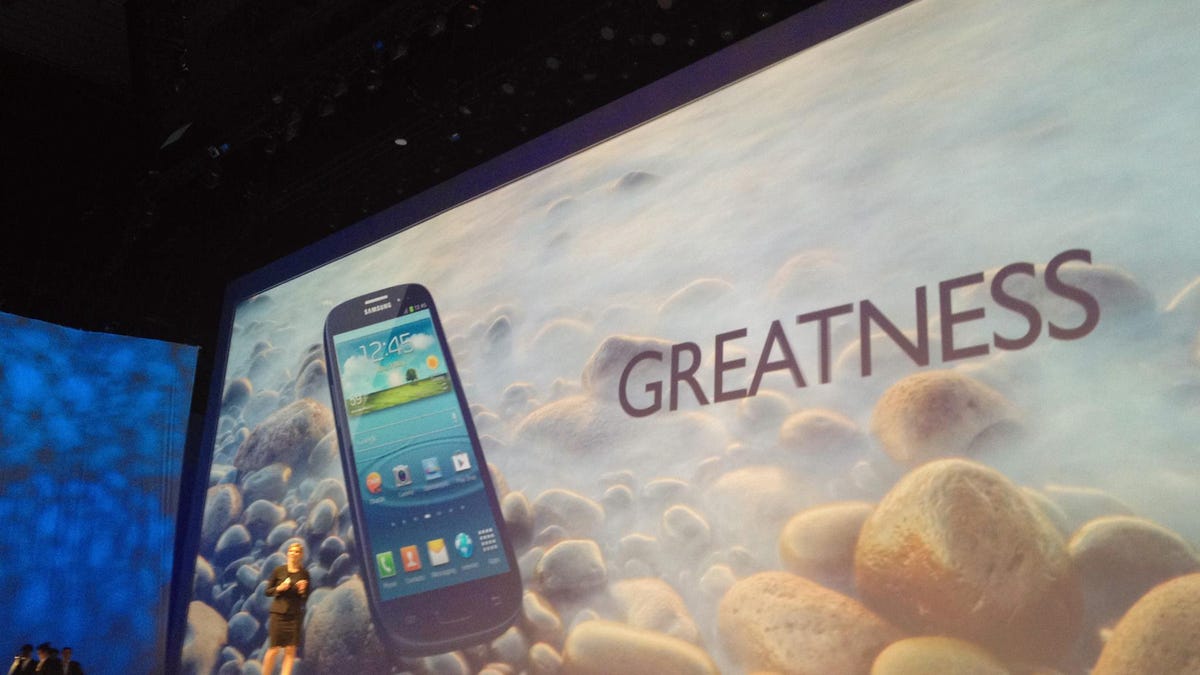Samsung has winning U.K. strategy, but users want more
London saw an astonishing Galaxy S3 launch, but Samsung's huge growth means it has to do a better job with software updates.

Samsung has been on a real roller coaster here in the United Kingdom in the last few months. Its phones are selling well in lots of countries, but the British seem to have a particular affinity for its Galaxy line. Last week the company chose London for the world launch of its flagship model, the Galaxy S3, staging one of the largest tech events I have seen in this country. CNET did a great job of covering it in a live blog, but what might not have come across was the sheer scale of the event.
Samsung hired Earls Court, a venue that's more commonly used for big concerts and massive exhibitions than product launches. During the 2012 Olympic Games, it will host volleyball. Samsung used the entire space to launch a single product.
In front of a thronging, buzzing crowd, a ridiculously large projection screen flashed through the presentation as an orchestra added pomp to the proceedings. At the end of the presentation, the huge screen lifted to reveal another vast hands-on area behind, along with Samsung's new pop-up shops. I stood at the back next to a local retailer who was watching open-mouthed at the whole thing unfolding.
The scale of the launch reflected a company that's feeling confident about its position, and to a large extent that confidence is justified. According to some numbers at least, Samsung is winning the smartphone war. Last week, IDC released figures that showed Samsung overtaking all other players in terms of smartphone shipments.
What's really interesting to me though are the numbers from Kantar Worldpanel, which show just how strong Android is in the U.K. compared to Apple's iOS. Kantar Worldpanel's numbers put Android's share of smartphone sales at 49 percent, compared to 29 percent for iOS. Contrast that with the U.S., where Android has 43 percent to Apple's 47 percent. There are many reasons that Android phones are so strong in the U.K., but one of the most important is the strength of the Samsung Galaxy portfolio.
As I argued for CNN last week, Samsung's strategy seems to be winning over Apple's here. However much money you have to spend on a new phone, whatever sized screen you need and no matter how gargantuan your hands are, Samsung has a Galaxy phone that will fit your needs. People like me often complain that the range is confusing because there are so many similar models, but consumers don't appear to mind. In this space, infinite choice seems to be winning, at least for now.
It hasn't all been good for Samsung here recently though. The rapid expansion in sales has led to some real growing pains. Recently the company generated a ton of vitriol from its own customers in the U.K after messing up the Ice Cream Sandwich software upgrade process for its Galaxy S2. Re-hashing all of its mistakes here would take up too much space (you can get a sense of the frustration caused from this piece). Suffice to say there's only one British non-swear word that can sum the whole episode up: omnishambles.
Once upon a time, this sort of software mess-up would have passed under the radar unnoticed, but Samsung's popularity has produced a legion of vocal customers that are all too ready to complain when they are messed around. But the company now knows that people are watching, and is strongly hinting that everything will be better next time around.
Provided it can avoid creating too many customer service problems for itself in the future, my best guess is that the two-horse smartphone race is set to continue, in Britain at least, with the likes of HTC, Sony, Nokia, and RIM left to pick up the crumbs.

